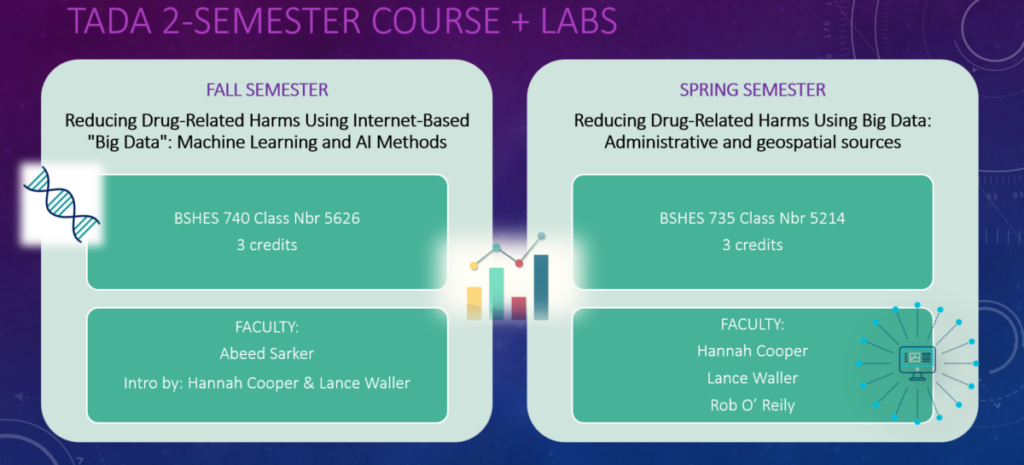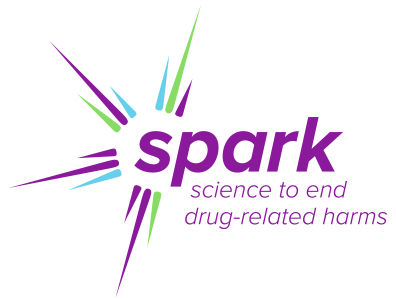TADA Courses are open to all graduate students who meet prerequisite requirements for each course. The following list of courses are required for all Fellowship and Certificate candidates:
| BSHES 735 TADA: Reducing Drug-Related Harms Using “Big Data”: Administrative, Geospatial & Network Sources | 3 credits, Spring Semester |
| BSHES 740 TADA: Reducing Drug-Related Harms Using Internet-Based “Big Data”: Machine Learning and AI Methods | 3 credits, Fall Semester |
| BSHES 745 TADA: Professional Development, Current Topics and Dissertation Workshop course | 1 credit/semester, 4 total required |
| Two advanced, graduate-level courses in chosen track, approved on case-by-case basis by TADA leadership. (Tracks include: Geospatial Analysis; Analyzing large administrative databases; Machine Learning; Genetic and Environmental Influences and Interactions; Social networks) | Min. 4 credits (2 credits each) required |
TADA 2-Semester Course Sequence: BSHES735 and BSHES740
- We recommend, but do not require, taking the Spring course first.
- *Syllabi examples below are for course planning purposes only and are subject to change.

BSHES 740 (Fall) Reducing Drug-Related Harms Using Internet-Based “Big Data”: Machine Learning and AI Methods
Pre-Requisites: It is recommended that students be comfortable working in a Unix/Linux environment, in addition to being familiar with database formatting using R or SQL via SAS.Prior completion of the following courses/ equivalents is also needed to successfully complete this module:
BSHES 735 (Spring)Reducing Drug-Related Harms Using “Big Data”: Administrative & Geospatial Sources
TADA Spring Syllabus_31.Jan.2025*Pre-Requisites: This course will require computing in different programs and different environments. Familiarity and comfort with the following is needed to successfully complete the course:
– Regression (examples: BIOS 501, BSHES 700)
– SAS (examples: BIOS 501)
– R (examples: BIOS 544)
BSHES745: TADA Professional Development, Current Topics and Dissertation Workshop (Spring and Fall)
This is a reading/seminar course that focuses on developing a synergistic cohort of interdisciplinary faculty and students to discuss the promise and pitfalls of applying advanced data analytics, data science, and artificial intelligence methods to research related to substance use with a goal of reducing drug-related harms in affected individuals. The course will stress the importance of an interdisciplinary, team-science approach to translating analytics to action. Course activities include:
- TADA Journal Club – readings of scientific literature, group discussion, demonstrations of techniques, and 2-4 in-depth discussions with authors of recent research in the area detailing data sources, techniques used, and challenges along the way.
- Professional Development – selected topics to enhance students’ professional trajectories as research professionals applying advanced data analytics to address drug-related harms. I
- Dissertation Workshop – each student with provide updates on their dissertation progress and will be encouraged to bring questions/challenges to the class for discussion.
Prerequisite: Open to current TADA Fellows and Certificate students. Other interested graduate students may enroll with approval from the instructors.
